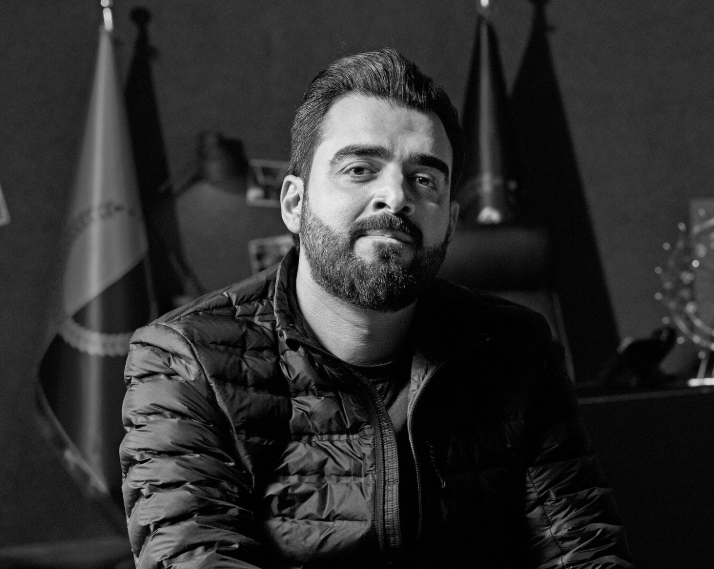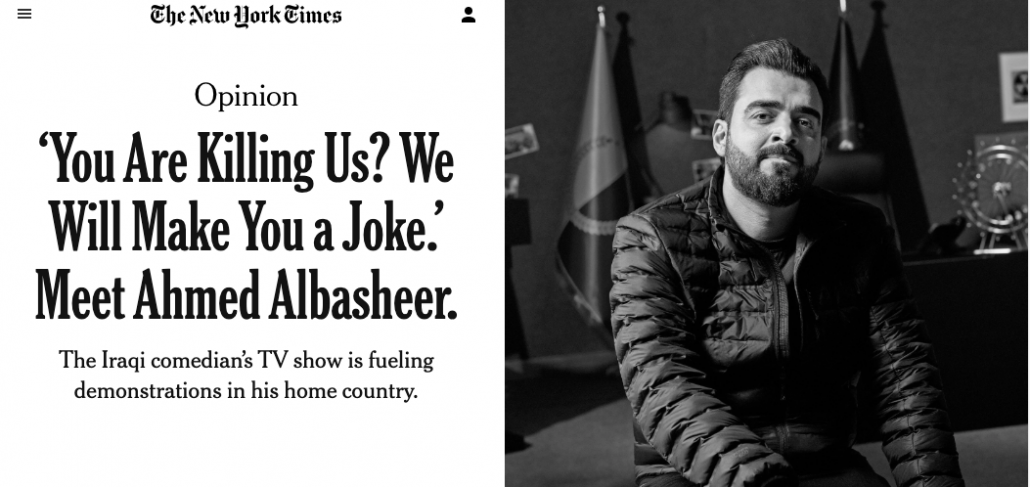Iraqi Comedian Leads Protests in Baghdad, from Yale
from the New York Times
By
Ms. Rosenberg is a co-founder of the Solutions Journalism Network, which supports rigorous reporting about responses to social problems.
Last week in the studio where he tapes the “Albasheer Show,” Ahmed Albasheer put on a dark presidential hat and a jacket covered in an absurd amount of medals and gold braid, and sat at his desk in an office adorned with the seal of the president of the Republic of Albasheer.
The republic is his invention of course, but Iraqis know what he is mocking. Mr. Albasheer, a 35-year-old journalist, fights for his country with his sense of humor. He has a repertoire of slightly deranged expressions and inspired comic timing, in Arabic (I’m told) and, more surprisingly, in English — a language he didn’t really speak until recently.
Since it began airing in 2014, Mr. Albasheer’s weekly show has become one of the most popular shows in Iraq, airing on YouTube and satellite television. In the past few weeks, the show has taken on new importance. Thousands of young Iraqis are demonstrating, in ways the country has never seen before. The “Albasheer Show” is deeply intertwined with the protests. Mr. Albasheer exposes the workings of power in Iraq, covers the protests and the government’s brutal response, exhorts the protesters to stay peaceful, amplifies their voices and boosts their morale. Some in Iraq believe the protests wouldn’t be happening without him.

Since Oct. 1, young people have been protesting in Baghdad and other cities in southern Iraq, with thousands camped in Baghdad’s Tahrir Square since Oct. 25.
Previous protests in Iraq were party-led and focused on electricity and jobs. These are different — truly grass roots, leaderless, party-less, uniting rich and poor, Sunni and Shiite, men and women. A protester and blogger who goes by the name Hayder Hamzoz — he’s also organizer of the Iraqi Network for Social Media, an association of bloggers and citizen journalists — said that about a quarter of protesters during the day are female.
The protests aim at the heart of Iraqi power, a system largely designed by the American occupiers of Iraq in 2003. The system divides spoils and patronage among various religious sects and political parties.
The protesters’ argument — also Mr. Albasheer’s argument — is that the government creates these divisions to keep itself in power. So far, the protests have toppled the prime minister and led to the passage of a new election law. But there is no new prime minister, and it’s not clear how the election law would actually work. Protesters also want a new government and a new election under United Nations supervision. They want Iran, the main foreign backer of the system, out. Their slogan is “We want a country.”
So far, the Iraqi government has responded with extreme brutality and acted with impunity. Security forces and masked gunmen have killed more than 500 people, wounded thousands more and kidnapped many others. Suha Oda, an Iraqi journalist and activist on women’s issues, said that the government targets women, “specifically kidnapping and killing female protesters, to pressure families to prevent women from participating.” Ms. Oda said — and everyone I talked to concurred — that among protesters there has not been a single report of a sexual assault. “You are girls and boys in the same place with cooperation, and no harassment,” Mr. Albasheer has said on his show. “I am very proud. I am in love with that.”
“All of our revolutions before were party-oriented,” said Zainab Salbi, an Iraqi-American campaigner for women’s rights and peace. “This is the first time it’s the people. They’re saying, ‘We’re Muslims, and we’re done with the divisions.’ We are all shocked this has happened. My father is 77, and he calls me crying, saying, ‘In all my life I’ve never seen such a thing.’”
“You are strong because you have no leader,” Mr. Albasheer often says on the show, speaking to the protesters. “This is the people’s voice. No one can stop this at any moment. No one can claim he is the reason people are out on the street.”
Tahrir Square has become its own city. The protesters have organized security, cleaning, electrical repair, food, showers, toilets, a small hospital, a radio station, a newspaper, civics classes, a library and medical care, including psychotherapy. Protesters play music, shoot videos and paint murals. A big screen shows football games and YouTube videos — including, of course, the “Albasheer Show.”
The show is an hour of Mr. Albasheer at his desk, mixed with video clips and original songs. He mocks the Godlike deference accorded Iraq’s presidents, the country’s corruption, the use of religion for political gain. When he did a show in a cleric’s costume (split into white on one side and black on the other to indicate different religious affiliations), he gravely announced that since he was now a cleric, he had to form his own militia.
The show begins with video of young Iraqis greeting the show and often ends with Mr. Albasheer talking directly to the protesters. “He’ll say, ‘Wave if you can see me,’” Mr. Hamzoz said. “He can’t see us, of course, but we’ll wave at him.”
In the protests’ first, most violent week, when more than 100 people were killed, Mr. Albasheer told no jokes. “The first ones were a huge responsibility,” he said. “I would show video of young men getting killed by a sniper and start to cry.”
Now he is funny again. “We need to humiliate the politicians,” he said. “You are killing us? We will make you a joke.”
Mr. Albasheer is now shooting the show in New Haven, Conn., where he has been on a fellowship at Yale. His crew of about 25 people work from a country he asked me not to name. Half of them work uncredited because of the danger.
Iraqis watch the show on satellite TV on Germany’s Deutsche Welle Arabic channel. It repeats about once a day at different times to try to escape government jamming. The show also has 3.8 million followers on YouTube. It is, of course, in Arabic, but Mr. Albasheer also taped two short programs in English (one pretty funny, one sober) to tell the world about the protests. (He said that his income comes from the program and from a company he owns that does other TV production.)
Mr. Albasheer’s model was Jon Stewart (he calls George Carlin his idol), and the two have been compared. The comparison goes only so far. Mr. Stewart’s programs were not jammed. Unlike Mr. Albasheer, Mr. Stewart did not get daily death threats; has not had to flee his country; has not seen his father, brother, best friend and countless other family members and friends murdered; and has not been the victim of a suicide bomber.
Mr. Albasheer was once an ordinary correspondent, anchor and talk-show host at several of Iraq’s highly controlled TV news stations. Then, at a poetry celebration for the Prophet Muhammad in 2011, a man burst in wearing a suicide vest. “I looked him in the eye trying to explode himself,” he said. “Those two seconds were very long seconds. I had time to think: If I am dead now, who am I?”
He ran and found shelter behind a wall. But his best friend and several other friends were killed.
He didn’t leave his house for the next six months. “I’m just sitting at home getting fatter,” he said. “I was afraid of everything. I was waiting for I don’t know what. Just to die, maybe.”
But he remembered his long two seconds thinking: Who am I? He made a decision: He was someone who would say whatever he wanted.
He moved his family to Jordan, and while working as a journalist, he tried comedy news. In 2014 he began the “Albasheer Show.”
The show has fueled the protests by engaging young people with the core structures of power in Iraq. Mr. Albasheer is not the only one to talk about them, but because he’s funny, he’s the one whom people watch — especially young people.
His decision to speak his mind earned him trust. “He became important when he started to be very clear with his messages,” Mr. Hamzoz said. “Before, he’d say, ‘There’s a militia group behind that,’ and make fun of them. But he didn’t name it, or its leader.”
That changed three years ago, with the cleric episode. He began to name people, even militia leaders. “It’s very difficult to say that — 100 percent to be killed or kidnapped,” Mr. Hamzoz said. “His show broke the fear.”
The show also gives the protests more staying power. For people risking bullets daily, it matters to know that the government cannot hide its brutality. Just as important, protests last only as long as people feel heroic and proud, and feel as if they’re making a difference — feelings the show reinforces every week.
“Iraq is not going to change only with new ministers,” Mr. Albasheer tells them. “The whole system must change. You will change Iraq.”
Tina Rosenberg (@tirosenberg) won a Pulitzer Prize for her book “The Haunted Land: Facing Europe’s Ghosts After Communism.” She is a former editorial writer for The Times and the author, most recently, of “Join the Club: How Peer Pressure Can Transform the World” and the World War II spy story e-book “D for Deception.”
To receive email alerts for Fixes columns, sign up here.
The Times is committed to publishing a diversity of letters to the editor. We’d like to hear what you think about this or any of our articles. Here are some tips. And here’s our email: letters@nytimes.com.
Follow The New York Times Opinion section on Facebook, Twitter (@NYTopinion) and Instagram.


